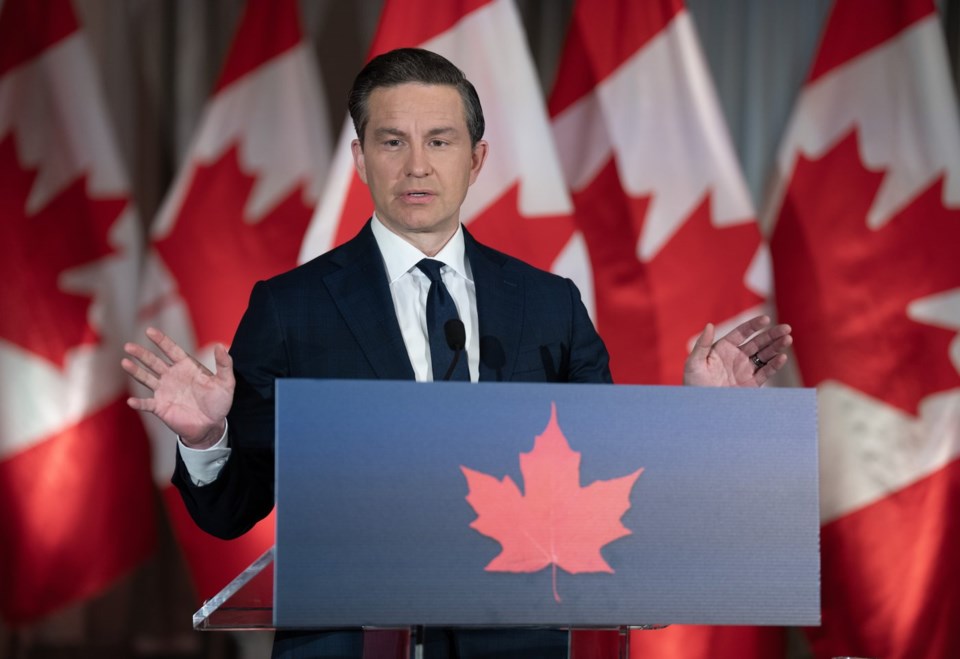OTTAWA — The Conservatives want Prime Minister Mark Carney to sell all the assets in his blind trust to avoid any possible conflicts of interest.
Carney set up the blind trust after he was sworn in as prime minister in March and the details of how it works were made public on Friday.
They show that the prime minister has set up screens to avoid potential conflicts related to his previous interests in Brookfield Asset Management, Brookfield Corporation and Stripe Inc.
But Conservative Leader Pierre Poilievre believes that's not enough.
He told reporters at a press conference Monday that Carney knew what was going into his trust at the time he divested and argued the prime minister could still benefit personally from decisions that affect Stripe or Brookfield's wide portfolio of businesses.
"We're calling on the prime minister to sell his investments, turn them into cash, hand them to a trustee who can invest them in a way that is completely blind to him so that he does not have any knowledge of what he owns," Poilievre said.
"That is the spirit of a blind trust."
Ian Stedman, professor of ethics and governance at York University, said there's merit to critiques that Carney knew what was going into his blind trust at the time it was set up.
But those criticisms are not unique to Carney, he said, and have more to do with the mechanism itself.
"Depending on the nature of what's in that blind trust, sometimes it's reasonable to think it might be bought and sold as markets move. And other times, it's unreasonable to think that the person who's in charge of the trust would ever dispose of that asset," Stedman said.
The ethics commissioner's office also released a list of shares Carney owned before creating the blind trust. They included shares in a number of companies, including payment processor Stripe, as well as options and deferred shares in Brookfield Corporation and Brookfield Asset Management.
Options — a contract that allows the holder to buy or sell a share at a specific price on or before a specific date — are one example of a security that a trustee would typically not exercise early if it wasn't a profitable opportunity, Stedman said.
Carney worked for Brookfield Asset Management and served on the board of directors of Stripe before he decided to run for the Liberal leadership in January.
He also owned shares in more than 560 companies through "an investment account managed by a third party in respect of which the prime minister did not control or direct the selection of investments," the disclosure said.
Poilievre claimed Carney would be "constantly distracted by his private interests" as he runs the government.
He said Liberal policies aimed at promoting heat pumps and modular housing put Carney in a position of conflict because Brookfield's investments also touch on those sectors.
Carney's ethics screen is administered by Marc-André Blanchard, Carney's chief of staff, and Privy Council Clerk Michael Sabia. They're tasked with ensuring Carney is not made aware of and does not participate in "any official matters or decision-making processes involving" Brookfield and Stripe, the disclosure said.
"This screen will prevent me from giving preferential treatment to any of the companies while I exercise my official powers, duties, and functions as a reporting public office holder," Carney said in the disclosure.
Stedman said that when policy changes affect an entire industry broadly, it's not considered a conflict under federal ethics rules even if a decision maker would have exposure to a company operating in that sector.
"Is it a conflict? Of course it is. Do our rules capture it as improper conflict? No," he said.
There's another caveat in the disclosure that says Carney would stop participating in a policy discussion if there was "disproportionate" interest to the companies in his screen.
Stedman said it's unclear what qualifies as "disproportionate," and the prime minister would benefit from clarifying that and the process Sabia and Blanchard would use to administer the screen.
A spokesperson for the Prime Minister's Office said Monday that Carney worked with the ethics commissioner to "exceed" the existing rules by creating the blind trust days before he took office.
The "vast majority" of what he divested was managed by a third-party account, the spokesperson noted, and Carney had no control or direction over specific investments.
"In all of his work for Canadians, the prime minister will continue to serve with the highest standards for integrity at all times," his office said.
Poilievre said the Conservatives would propose amendments to the law that would force the sale of assets in the way he's suggesting for Carney, raising the bar for ethics disclosures to avoid conflicts.
That pitch for Carney to completely cash out of his investments before they go into a blind trust would likely work to mitigate those conflicts, Stedman said, but he warned such a policy could come with some trade-offs.
If Canadians want to attract high-achieving people from across walks of life — including those with business experience who have accumulated wealth and assets over their careers — then asking them to completely cash out before even running for public office could "disincentivize" the appeal of civic service, Stedman said.
"Very few people have what (Carney) has in his portfolio. To say to him, he's got to get rid of it all to serve the public, I'm not so sure you're going to get someone like him stepping up too often in that case," he said.
— with files from Sarah Ritchie
This report by The Canadian Press was first published July 14, 2025.
Craig Lord, The Canadian Press




